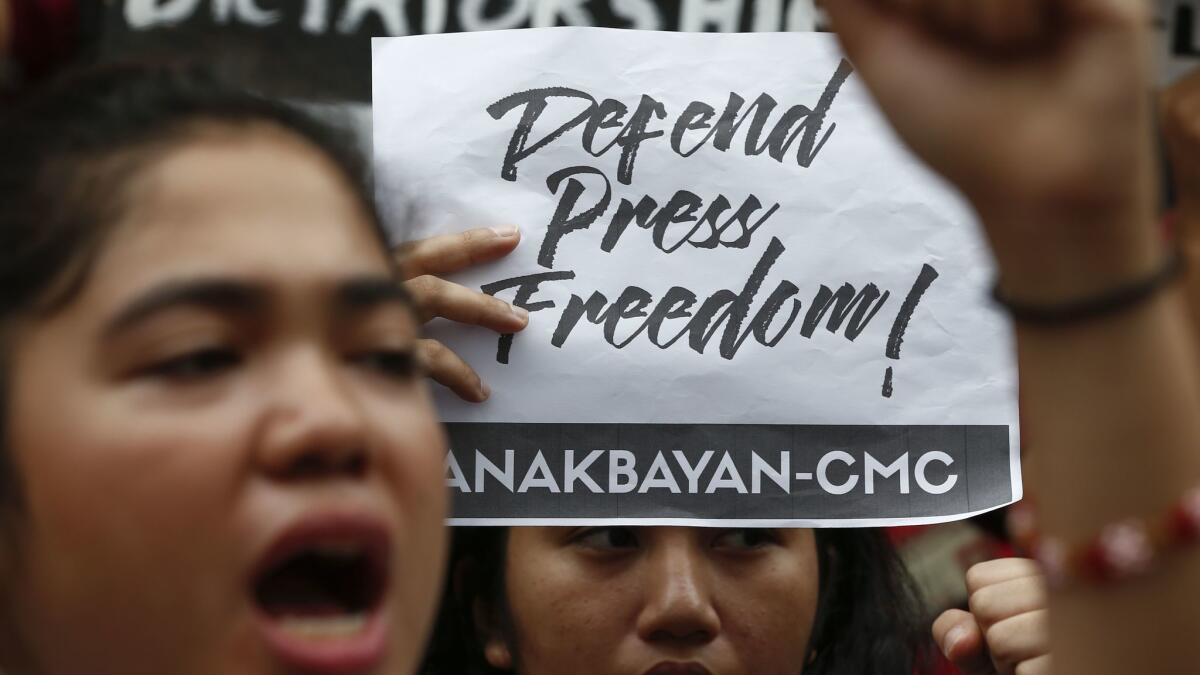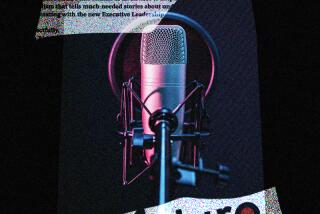Philippine government orders closure of news site Rappler, fueling concerns about press freedoms

- Share via
Reporting from Beijing — Rappler, a digital pioneer in the Philippine media scene, won international awards for its critical, unabashed look at President Rodrigo Duterte’s deadly drug war.
Now the independent online news site is trying to stay alive.
Philippine authorities this week ordered Rappler to close, infuriating media rights groups and casting uncertainty on the sanctity of press freedoms in the three-decade-old democracy.
Rappler’s troubles appear to stem from its connection to prominent American tech czar Pierre Omidyar, founder of Ebay, whose philanthropic investment network has poured money into the upstart website.
Rappler is one of several news outlets supported by the California-based Omidyar Network, which Omidyar runs. The 50-year-old billionaire has also helped start Honolulu Civil Beat in Hawaii and the online investigative website the Intercept, founded by journalists Glenn Greenwald, Laura Poitras and Jeremy Scahill. Since its launch in 2012, Rappler has become the Philippines’ third most-popular website.
But the nation’s Securities and Exchange Commission this week concluded that Rappler had used a “deceptive scheme” to violate constitutional rules that require media companies to be fully owned by Filipinos.
The ruling essentially revoked the publication’s license.
“The commission is ordering us to close shop, to cease telling you stories, to stop speaking truth to power, and to let go of everything that we have built — and created — with you since 2012,” the editors said in a note to their readers. “This is pure and simple harassment.”
Rappler has acknowledged it has two foreign investors: Omidyar and North Base Media, a firm that focuses on media companies in emerging markets. But the news site has insisted that the investments went through so-called depository receipts that allow companies to access international funding without ceding Filipino ownership.
Other media companies operating in the country have used similar depository receipts. But regulators pointed to a clause in the deal between Rappler and Omidyar Network that they said could allow the California company to vet management decisions.
Omidyar Network denied any interference in the site, either on a managerial or editorial level. This is “an unfortunate interpretation of Filipino law that reduces press freedom and independent news coverage in the Philippines,” it said in a statement.
North Base Media, the other investor, also questioned the order. “Revoking a company’s license to operate over a contractual clause that the SEC could just as easily have ordered changed seems both extreme and political,” Marcus Brauchli, the organization’s cofounder and a former top editor of the Wall Street Journal and Washington Post, said in an email.
The SEC did not require the website to shut down immediately; it continued to operate Tuesday with an article about its own future as the lead story.
The decision in this Southeast Asian nation follows the shuttering last year of Cambodia’s independent English-language newspaper because of government pressure in an increasingly autocratic country. The paper titled its last article, “Descent into outright dictatorship.” Rights advocates fear that, as in Cambodia, the Philippines’ decision signals a further step toward strongman rule.
Duterte, who took office in 2016, has pursued a war on drugs that resulted in the extrajudicial killing of thousands and led to condemnation from the United Nations.
Rappler has received acclaim for its chronicling of the brazen impunity with which Duterte’s officials have conducted the drug campaign, and the ways innocent families have suffered from its effects.
“My bet is if Rappler hadn’t been so critical of the government … this case wouldn’t have come about,” said Malcolm Cook, senior fellow at the ISEAS-Yusof Ishak Institute in Singapore, who studies the Philippines.
The situation with Rappler adds to concerns that Duterte is abandoning the democratic principles of his predecessor for an approach closer to that of Ferdinand Marcos, the dictator who silenced newspapers and jailed opponents during his rule from the mid-1960s to 1986.
Police arrested one of Duterte’s toughest critics last year on drug-trafficking charges, and his vice president has accused him of quashing dissent. Duterte this December extended martial law in the country’s south despite the misgivings of lawmakers.
The president has repeatedly attacked news outlets, accusing Rappler during his state of the nation address last year of having total American ownership.
Harry Roque, the president’s spokesman, told reporters Tuesday that Duterte had nothing to do with the order from the five-person commission on Rappler’s registration. It was made “by individuals who were not his appointees,” Roque said. “He could not control the majority of the commissioners.”
A surge of Philippine journalists, lawmakers and international rights organizations launched immediate protests over the SEC’s ruling.
Sen. Risa Hontiveros called the decision “Marcosian” on Twitter and “a move straight out of the dictator’s playbook.”
The Committee to Protect Journalists condemned the order as a “direct assault on freedom of the press.” The Foreign Correspondents Assn. of the Philippines said it was “tantamount to killing the online news site.”
Not everyone sees the decision through the veil of politics. Rappler is “just crying foul over a legal issue,” said Eduardo Araral, associate professor at the Lee Kuan Yew School of Public Policy in Singapore, who tracks Philippine contemporary society. “There are so many media critics against Duterte and he’s let them be.”
Rappler — whose name comes from slang “rap,” to discuss, and “ripple,” to make waves — plans to try its luck in court.
“We will continue bringing you the news, holding the powerful to account for their actions and decisions, calling attention to the government lapses that further empower the disadvantaged,” the news outlet said in its note. “We will hold the line.”
Meyers is a special correspondent.
Twitter: @jessicameyers
In the Philippines, poverty and corruption fuel the drug trade
Ties between the U.S. and Philippines run deep. It won’t be easy for Rodrigo Duterte to unravel them
UPDATES:
1:15 p.m.: This article was updated with additional background on politics in the Philippines.
This article was originally published at 9:25 a.m.
More to Read
Sign up for Essential California
The most important California stories and recommendations in your inbox every morning.
You may occasionally receive promotional content from the Los Angeles Times.










